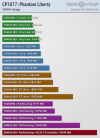Without agreeing to such basic concepts, we literally cannot ever argue that Nvidia is deliberately exploiting naming to push lower tier products to a higher tier, thus being able to charge more for less.You're arguing semantics in a response to a post from a moderator that such an argument really isn't adding to the conversation?
Revisit what exactly the debate is. What is it about die size that affects whatever it is people are discussing. Notions of 'high' and 'low' end don't need enter it and so don't need defining to a point everyone can agree to push the debate forwards.
We all know very well that's exactly what they're doing, but if we're going to play this silly semantic devil's advocate contrarianism game where we're not allowed to mention how die size relates to the tier of product in the range stack, then we literally cannot even accuse them of doing this, because nobody could actually provide any evidence that they're doing this and we could just write any such argument off as just entitled whining and say that people have no room to complain.
Now if we just dont want any talk of pricing or Nvidia's scummy practices or whatever here, fine, but you should make that clear instead.
Last edited:


